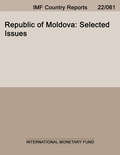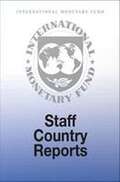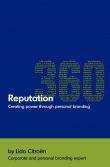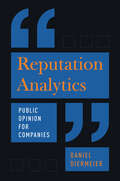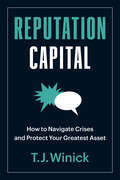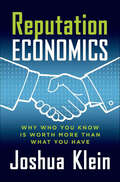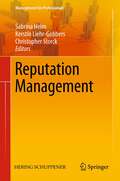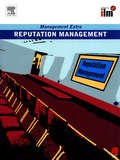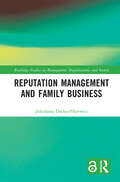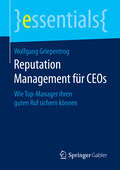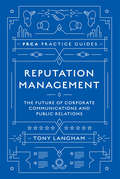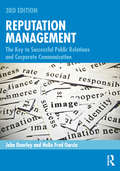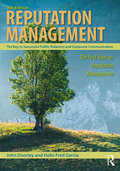- Table View
- List View
Republic of Latvia: Selected Issues (Imf Staff Country Reports #Country Report No. 13/29)
by International Monetary Fund. European Dept.A report from the International Monetary Fund.
Republic of Latvia: Statistical Appendix
by International Monetary FundA report from the International Monetary Fund.
Republic of Lithuania: Third Review Under the Stand-By Arrangement--Staff Report; Press Release on the Executive Board Discussion; and Statement by the Executive Director for the Republic of Lithuania
by International Monetary FundA report from the International Monetary Fund.
Republic of Madagascar: Selected Issues (Imf Staff Country Reports #Country Report No. 15/25)
by International Monetary Fund. African Dept.A report from the International Monetary Fund.
Republic of Moldova: 2003 Article IV Consultation--Staff Report; and Public Information Notice on the Executive Board Discussion
by International Monetary FundA report from the International Monetary Fund.
Republic of Moldova: Poverty Reduction Strategy Annual Evaluation Report 2005
by International Monetary FundA report from the International Monetary Fund.
Republic of Moldova: Selected Issues (Imf Staff Country Reports #No. 12/289)
by International Monetary Fund. European Dept.A report from the International Monetary Fund.
Republic of Moldova: Selected Issues (Imf Staff Country Reports #No. 12/289)
by International Monetary Fund. European Dept.A report from the International Monetary Fund.
Republic of Mozambique: Poverty Reduction Strategy Paper Progress Report (Review of the Economic and Social Plan for #2003)
by International Monetary FundA report from the International Monetary Fund.
Republic of North Macedonia: Selected Issues (Imf Staff Country Reports)
by International Monetary Fund. European Dept.A report from the International Monetary Fund.
Republic of North Macedonia: Selected Issues (Imf Staff Country Reports)
by International Monetary Fund. European Dept.A report from the International Monetary Fund.
Republic of Palau: Selected Issues (Imf Staff Country Reports #Country Report No. 14/111)
by International Monetary Fund. Asia and Pacific DeptA report from the International Monetary Fund.
Reputation 360: Creating Power Through Personal Branding
by Lida CitroenThis inspiring "how to" book teaches professionals at all levels how to define, create and market their personal brand to target audiences. Effective marketing of a personal brand attracts key opportunities, ensure consistent value and empowers the individual with tools for lifelong reputation management. The author, an internationally recognized corporate and personal branding expert, provides more than 15 case studies of executives and professionals who have leveraged strong personal brands to bring them great success.
Reputation Analytics: Public Opinion for Companies
by Daniel DiermeierA scientific approach to corporate reputation from the field’s leading scholar. Public opinion is a core factor of any organization’s success—and sometimes its failings. Whether through crisis, mismanagement, or sudden shifts in public sensibility, an organization can run afoul in the span of a Tweet. In Reputation Analytics, Daniel Diermeier offers the first rigorous analytical framework for understanding and managing corporate reputation and public perception. Drawing on his expertise as a political scientist and management scholar, Diermeier incorporates lessons from game theory, psychology, and text analytics to create a methodology that has immediate application in both scholarship and practice. A milestone work from one of social science’s most eminent scholars, Reputation Analytics unveils an advanced understanding of an elusive topic, resulting in an essential guide for academics and readers across industries.
Reputation Analytics: Public Opinion for Companies
by Daniel DiermeierA scientific approach to corporate reputation from the field’s leading scholar. Public opinion is a core factor of any organization’s success—and sometimes its failings. Whether through crisis, mismanagement, or sudden shifts in public sensibility, an organization can run afoul in the span of a Tweet. In Reputation Analytics, Daniel Diermeier offers the first rigorous analytical framework for understanding and managing corporate reputation and public perception. Drawing on his expertise as a political scientist and management scholar, Diermeier incorporates lessons from game theory, psychology, and text analytics to create a methodology that has immediate application in both scholarship and practice. A milestone work from one of social science’s most eminent scholars, Reputation Analytics unveils an advanced understanding of an elusive topic, resulting in an essential guide for academics and readers across industries.
Reputation Capital: How to Navigate Crises and Protect your Greatest Asset
by T.J. WinickA longtime broadcast journalist, ABC News correspondent, and business communication strategist shows how you can craft an honest and authentic response to any scandal, rather than try to deny it, and ultimately bolster your brand.In twenty years as a television reporter, T. J. Winick covered many scandals, including the British Petroleum oil spill, the Pennsylvania State University football scandal, the Catholic priest molestation scandal, and the Toyota recall of 20092010. The biggest mistake he's seen organizations make in their crisis communication is to try to make it go away by refusing to apologize, declining to comment, or going on the attack-anything to deflect attention. Instead, Winick argues for communicating ethically, with transparency, honesty, authenticity, and empathy. Handled correctly, the way you address an egregious violation of your standards can increase your reputation capital. It can remind people of what those standards are and how strongly you believe in them. Drawing on his intimate insider knowledge of how the media works, Winick addresses every aspect of how to respond to a scandal. He includes the Ten Crisis Commandments-universal dos and don'ts. And he gives practical advice on who you should talk to and when, who should do the talking, how to form a crisis communication team, what tone you should strike in your message, how to work with the media, and much more.
Reputation Economics: Why Who You Know Is Worth More Than What You Have
by Joshua KleinAs the internet has increasingly become more social, the value of individual reputations has risen, and a new currency based on reputation has been created. This means that not only are companies tracking what an individual is tweeting and what sites they spend the most time on, but they're using this knowledge to predict the consumer's future behavior. And a world in which Target knows that a woman is pregnant before she does, or where a person gets a job (or loses one) based on his high school hijinx is a scary one indeed. Joshua Klein's Reputation Economics asks these crucial questions: But what if there were a way to harness the power of these new technologies to empower the individual and entrepreneur? What if it turned out that David was actually better suited to navigate this new realm of reputation than Goliath? And what if he ushered in a new age of business in which reputation, rather than money, was the strongest currency of all? This is all currently happening online already.Welcome to the age of Reputation Economics:-Where Avis is currently discounting car rentals based on Twitter followers-Where Carnival Cruise Lines are offering free upgrades based on a Klout score-Where Amazon and Microsoft are a short way away from dynamically pricing their goods based on a consumer's reach and reputation online-Where Klout scores are being used to vet job applicationsThe value of individual reputation is already radically changing the way business is done.
Reputation Management
by Christopher Storck Kerstin Liehr-Gobbers Sabrina HelmReputation is the most complex asset of an organization. Despite the call for consistent management of corporate reputation comprehensive approaches to measure and steer a company' s reputation are still in their infancy. Reputation management aims at creating a balance between stakeholder demands, perceptions and corporate reality in order to foster behavior that helps a company achieve its business goals. It needs to be based on thorough research and requires orchestrated execution through management processes across organizational units, communication disciplines, and countries. This calls for a management system to establish a closed cycle of strategic planning, implementation, performance measurement, and reporting. The book gives answers to the following questions: What is reputation and which conceptualizations do exist? What are the state-of-the-art methods and tools to measure corporate reputation? What are best practice examples and future trends in the field of corporate reputation management?
Reputation Management Revised Edition: Revised Edition (Management Extra Ser.)
by ElearnStuck for ideas, inspiration or just want to work differently? Management Extra brings all the best management thinking together in one package. The books are practical and well structured to provide an in depth treatment of these management topics. Titles in the series: * Business Environment * Change Management * Development for High Performance * Effective Communications * Financial Management * Information and Knowledge Management * Leadership and Management in Organisations * Leading Teams * Making Sense of Data and Information * Managing Markets and Customers * Managing for Results * Managing Health, Safety and Working Environment * Managing Legal and Ethical Principles * Managing Yourself * Positive Working Relationships * Project Management * Quality and Operations Management * Reaching Your Goals Through Innovation * Recruitment and Selection * Reputation Management The series fuses key theories and concepts with applied activities to help managers examine how they work in practice. The books are created with individuals in mind. They are designed to help you improve your management skills. Management Extra can also be used in conjunction with management programmes of study aligned to standards. Each of the books has case studies, self assessments and activities all underpinned by knowledge and understanding of the frameworks and techniques required to improve performance. Management Extra provides managers and trainers with a handbook for action and development. "You found it – what a find! A practical resource packed with all the relevant theory and suggested activities to support your professional development. An essential resource to have at your fingertips, jump in and enjoy."--Russell Jeans, Learning and Development Manager, ntl "All the essential concepts are here, presented in an easily digestible format with lots of up to date case studies and references – but, most importantly, with plenty of thought provoking activities and self-diagnostic exercises to make the learning personal and transferable."--Peter Manning, Head of Training & Development, News International Newspapers Ltd
Reputation Management and Family Business (Routledge Studies in Management, Organizations and Society)
by Zdzisława Dacko-PikiewiczCorporate reputation is important in gaining long-term competitive advantage and building company value. Thus, the author points out the need to manage reputation, which, due to its complex nature and multidimensional character, is a serious and difficult challenge. The author develops a strategic model for family business reputation management. The book presents the review, systematization and synthesis of views on the notion of reputation and its role in building company value, the determinants of reputation; the identification of the characteristics and distinguishing factors of family businesses, areas of reputation building and resources involved in family business reputation building processes; and the description of determinants, components and processes in the field of corporate reputation management, and the identification of key links between them. It also identifies the key elements of the concept of family business reputation management and the relationship between them and practical recommendations for the use of reputation management concepts in improving the functioning of family businesses. The developed model can undoubtedly be seen as a pioneering contribution to research into the competitiveness of enterprises. The book will therefore be useful to researchers, students and managers who are interested in decision-making in family businesses, entrepreneurship and small business management, and leadership studies.
Reputation Management für CEOs: Wie Top-Manager ihren guten Ruf sichern können (essentials)
by Wolfgang GriepentrogDieses essential hilft Top-Managern und Kommunikationsverantwortlichen, die Manager-Reputation systematisch und konsequent zu sichern und weiterzuentwickeln. Ziel dieses Praxisleitfadens ist es, personenbezogene Reputationsfehler oder Widersprüche im Auftritt zu vermeiden, dadurch Schäden für das Unternehmen abzuwenden und stattdessen den guten Ruf des Spitzenpersonals als Basis für geschäftliche und unternehmerische Erfolge zu festigen. Der Autor beschreibt die einzelnen Bausteine und die systematischen Arbeitsschritte des Reputationsmanagements. Er macht die Anforderungen deutlich und erklärt das Zusammenspiel zwischen Top-Managern als „Hauptdarstellern“ und Kommunikationsprofis als „Regieführern“ des Auftritts.
Reputation Management: The Future Of Corporate Communications and Public Relations (PRCA Practice Guides)
by Tony Langham PrcaA good reputation is vital to success in business and in life. Organizations with the best reputations outperform rivals in a myriad of tangible ways; they recruit higher quality staff, succeed with smaller marketing budgets, and exert greater influence over Governments. Although in the long term reputation is based on reality and behavior, short term examples of organizations and individuals building unfair advantage can be seen all around us. Despite this, reputation remains an often misunderstood and neglected asset. <p><p>In Reputation Management: The Future of Corporate Communications and Public Relations, Tony Langham argues that reputation management is the future incarnation of public relations and corporate communications. Featuring specially commissioned essays, as well as exclusive interviews with leading CEOs, influencers and celebrities, the book covers issues as diverse as fake news, AI, James Bond, cyber security and internet bullying. Also included are contributions from thirty-nine of the world’s leading reputation managers who exclusively reveal the time they made the most difference to an organization's reputation.
Reputation Management: The Key to Successful Public Relations and Corporate Communication
by John Doorley Helio Fred GarciaReputation Management is a how-to guide for students and professionals, as well as CEOs and other business leaders. It rests on the premise that reputation can be measured, monitored, and managed. Organized by corporate communication units including media relations, employee communication, government relations, and investor relations, the book provides a field-tested guide to corporate reputation problems such as leaked memos, unfair treatment by the press, and negative rumors, and focuses on practical solutions. Each chapter is fleshed out with the real-world experience of the authors and contributors, who come from a wide range of professional corporate communication backgrounds. Updates to the third edition include: Global content has been incorporated and expanded throughout the book, rather than being restricted to only one chapter. Opening vignettes, examples, and case studies have been updated in each chapter. Additional case studies and examples with an international focus have been added.
Reputation Management: The Key to Successful Public Relations and Corporate Communication
by John Doorley Helio Fred GarciaReputation Management is an established how-to guide for students and professionals, as well as CEOs and other business leaders. This fourth edition is updated throughout, including: new social media management techniques for the evolving age of digital media, and perspectives on reputation management in an era of globalization. The book is embroidered by ethics, and organized by corporate communication units, such as media relations, issues management, crisis communication, organizational communication, government relations, and investor relations. Each chapter is fleshed out with the real-world experiences cited by the authors and contributions from 36 leaders in the field, including The Arthur W. Page Society, the International Communications Consultancy Organization, the PR Council, CVS Health, Edelman and Ketchum. This was the first book on reputation management and, now in its fourth edition, remains a must-have reference for students taking classes in public relations management, corporate communication, communication management, and business. CEOs, business leaders, and professionals working in these areas find it a reliable resource for measuring, monitoring and managing reputation.



